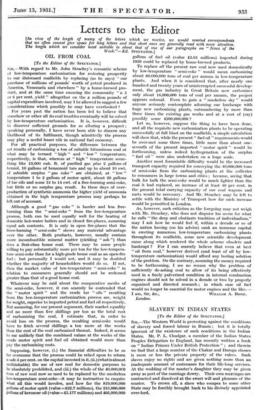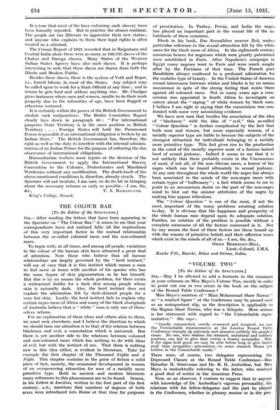[To the Editor of the SPECTATOR.]
we find that a large number of the Chakar and Daroga classes is more or less the private property of the rulers. Such slaves enjoy no rights and are given nothing more than an inadequate amount of sustenance for their life-long services.
At the wedding of the master's daughter they may be given away as part of the marriage dowry. Their own marriages are master. To crown all, a slave who escapes to some other State may be forcibly brought back to his divinely appointed
It is true that most of the laws enforcing such slavery have been formally repealed. But in practice the abuses continue. The people are too illiterate to appreciate their new status ; and anyone who explains to them their 'legal rights is often treated as. a criminal.
The Census Report of 1921 recorded that in Rajputana and Central India alone there were as many as 160,735 slaves of the Chakar and Daroga classes. Many Stites of the Western Indian States Agency have also such slaves. It is perhaps interesting to note that these slaves are drawn from both the Hindu and Moslem Faiths.
Besides these slaves, there is the system of Veth and Begar, i.e., forced labour, in most of the States. Any subject may be called upon to work for a State Official at any time ; and in return he gets food and seldom anything else. Mr. Chudgar gives instances where men and women, unable to do their work properly due to the infirmities of age, have been flogged or otherwise tortured.
It is certainly within the power of the British Government to abolish such malpractices. The Butler Committee Report clearly lays down in paragraph 46 : " For international purposes State Territory is in the same position as British Territory . . . . Foreign States will hold the Paramount Power responsible if an international obligation is broken by an Indian State." The British Government has, therefore, the right as well as the duty to interfere with the internal adminis- tration of an Indian Prince for the purpose of enforcing the due observance of international obligations.
Humanitarian workers must rejoice at the decision of the British Government to apply the International Slavery Convention to the Colonies, Protectorates and Mandated Territories without any modification. The death-knell of the above-mentioned conditions is, therefore, already struck. The
Spectator will not hesitate, I am sure, to do its bit in bringing about the necessary reforms as early as possible.—I am, Sir,







































 Previous page
Previous page